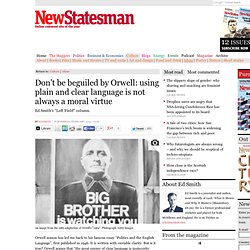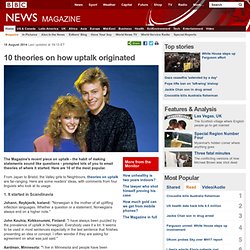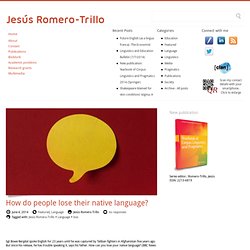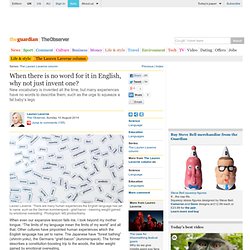

Don’t be beguiled by Orwell: using plain and clear language is not always a moral virtue. Orwell season has led me back to his famous essay “Politics and the English Language”, first published in 1946.

It is written with enviable clarity. But is it true? Orwell argues that “the great enemy of clear language is insincerity. When there is a gap between one’s real and one’s declared aims, one turns as it were instinctively to long words.” I suspect the opposite is now true. We live in a self-consciously plain-spoken political era. There is a new puritanism about the way we use words, as though someone with a broad vocabulary or the ability to sustain a complex sentence is innately untrustworthy.
Using the word 'gay' to mean 'crap' is a form of bullying of gay people. I like to think I'm down with youth culture and its slang. Well, a bit anyway. I understand that the word "sick" can mean "cool", and "bare" can mean "a lot". Never mind the hyperbolics. Please can I have some less? In the 1980s, it became fashionable for footballers to talk about “giving 100%” on the pitch, or “being 100% committed” to their clubs.

Before long, this was regularly upgraded to 110%. But even the impossible was soon deemed inadequate. By the 90s, players up and down the country were reportedly putting in 120%, 200% and 300% of their maximum possible effort. And in April, when the editorial director at London Live quit less than a month after the channel’s launch, the chief executive announced that he had “absolutely, 100,000% confidence” in the editorial team. Well, no one will ever be able to trump that level of confidence … unless they just say a bigger number. Warning: Why using the term 'coloured' is offensive - BBC Newsbeat. What Americans really eat – and tweet. One of the most common criticisms of Twitter is that it is really just a bunch of people talking about what they had for lunch.

And while this may well be true, it’s worth considering that what you had for lunch actually says rather a lot about you. In fact, tweeting about lunch rather than breakfast or brunch or dinner reveals something about where you’re likely to live, how you probably vote, what you weigh and your chances of getting diabetes. Over an eight-month period up to May this year, researchers at the University of Arizona analysed more than three million food-related posts (pdf) made by American tweeters, and found that not only did the importance of each daily meal differ across the country (the Midwest goes for breakfast; the West Coast likes dinner), they were also able to identify the most popular food-related words in each state: flan, for instance, in North Dakota, capers in Oregon, potatoes (not wholly surprisingly) in Idaho. 10 theories on how uptalk originated. 18 August 2014Last updated at 19:13 ET The Magazine's recent piece on uptalk - the habit of making statements sound like questions - prompted lots of you to email theories of where it started.

The Global Language Monitor. Frequently Asked Questions About the Global Language Monitor Q.What is the Global Language Monitor?

A.The Global Language Monitor documents, analyzes, and tracks the latest trends in word usage and word choices and their impact on the various aspects of culture, with a particular emphasis upon Global English.GLM, an internet media analytics company, was founded six years ago in Silicon Valley.It is a direct descendent of yourDictionary.com, the premier multi-language dictionary site with some 230 languages.YDC had very deep academic roots with some two dozen of the world’s top linguists on its Academic Council of Experts.The Global Language Monitor is one of the first companies to exclusively focus on English as the first, true global language, and its impact on various aspects of culture, such as politics, the arts, entertainment, science, technology, and the like.
The leading global media have come to rely upon GLM’s analysis and analytical techniques. 'FML,' 'YOLO,' 'Amazeballs' Added to Online Oxford Dictionary. How do people lose their native language? June 4, 2014 Featured, Language Jesús Romero-Trillo no responses Tagged with: Jesús Romero-Trillo • Language • loss Sgt Bowe Bergdal spoke English for 23 years until he was captured by Taliban fighters in Afghanistan five years ago. 3 June 2014) Some people have gone decades without speaking or hearing their first language but they retain the ability to speak it easily, says Dr Monika Schmid, a linguistics professor at the University of Essex in the UK.

ENGB3 Language Change. Attitudes to language change. ▶ My Blackberry Is Not Working! - The One Ronnie, Preview - BBC One. Why I’m looking beyond the English lexicon for the word that doesn’t exist. When even our expansive lexicon fails me, I look beyond my mother tongue.

“The limits of my language mean the limits of my world” and all that. Other cultures have pinpointed human experiences which the English language has yet to name.